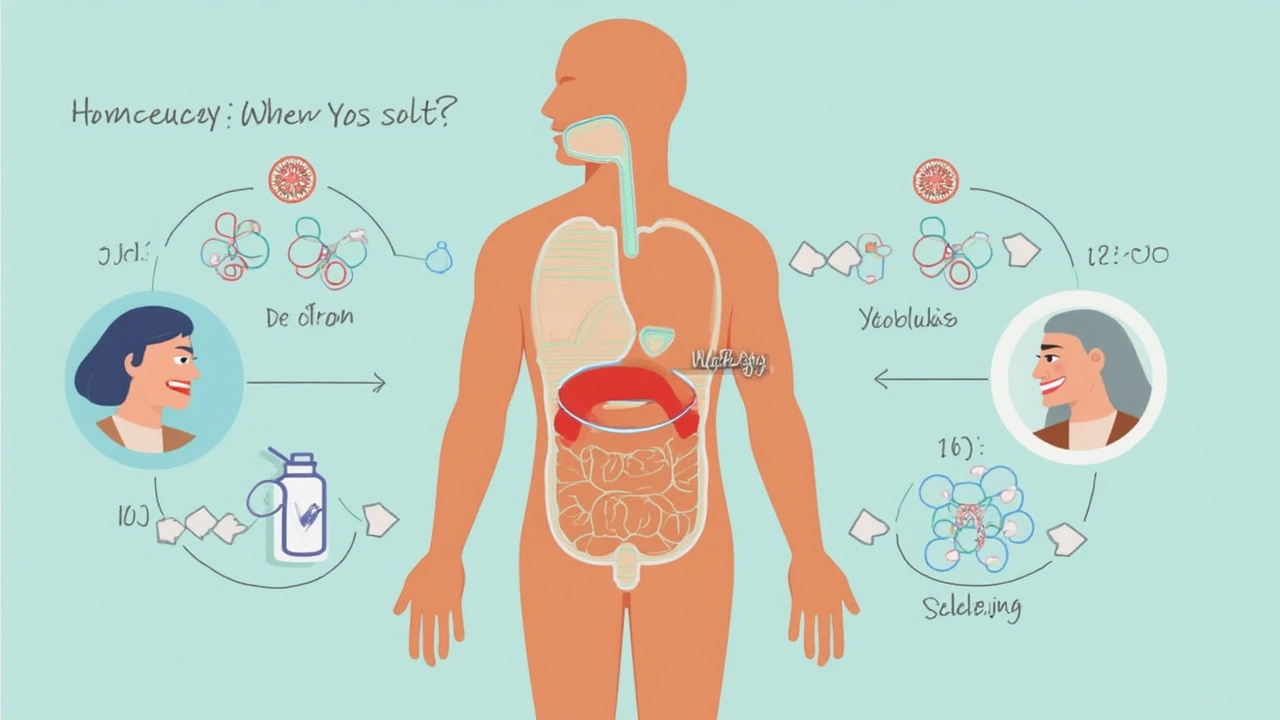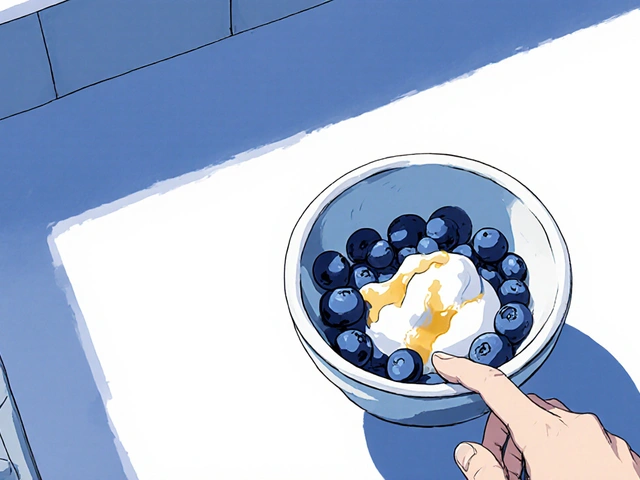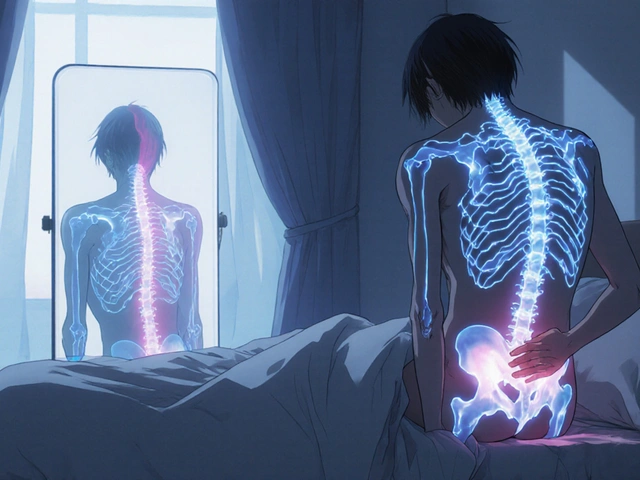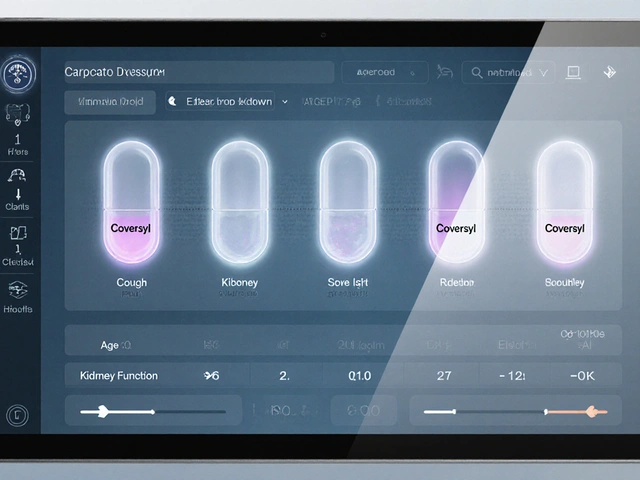Ever dug into a salty snack and then felt like your jeans shrunk two sizes? That sluggish, puffy feeling? It's not just in your head—sodium might actually be working behind the scenes to mess with your digestion. And honestly, it’s not just about water retention and that temporary squish around your waistline; there’s a whole backyard barbecue of reasons your stomach isn't happy after salty foods. Think you've got a handle on your salt shaker? The reality might surprise you.
The Science Behind Sodium: What Happens in Your Gut?
Why does sodium get such a bad rap? Sodium helps our nerves fire and muscles contract, sure—but too much, and your stomach throws in the towel. Here’s the deal: sodium attracts water. After a salty meal, your body scrambles to balance itself, pulling water into your digestive system. This extra water causes your stomach and intestines to swell. And that’s before you even think about how it all leaves your system.
One study in the American Journal of Gastroenterology found that people who ate high-sodium diets were more likely to complain about bloating than those who stayed under the daily recommended amount (about 2,300 mg for most adults, by the way). When you consistently overshoot that line, your gut works overtime. It holds onto more water and sometimes slows down digestion. So, you’re not just looking bloated—you might actually be moving things through your system more sluggishly, too.
If you think only people sensitive to salt run into these issues, think again. Even folks who claim salt never fazes them can end up gassy and uncomfortable after a big bowl of ramen. Recent research points out that sodium can actually change the way certain bacteria live in your gut. Some good bacteria can get thrown off track, and that affects how you break down food. Weird how your sushi night can basically tip the balance inside your belly, right?
Let’s Talk Salt: Common Foods That Surprise Your Stomach
Here’s something wild: a lot of the bloating blame falls on obvious suspects like chips and pretzels, but some sneaky foods are packin’ just as much sodium. Bread, breakfast cereals, cottage cheese, canned veggies—these aren’t exactly junk food, but they can hit your sodium limit fast.
Take a look:
| Food | Average Sodium per Serving (mg) |
|---|---|
| White Bread (1 slice) | 130 |
| Canned Soup (1 cup) | 850 |
| Packaged Ramen (1 block w/ flavor) | 1,760 |
| Deli Turkey (2 slices) | 520 |
| Pizza (1 slice, chain) | 640 |
Not gonna lie—these numbers add up. If you’re eating out or living off convenience foods, you could blow past your sodium limit before lunch break.
The real kicker is that it’s not only the processed food aisle that brings on bloat. Even home-cooked meals can quietly jack up your intake. One extra teaspoon of table salt? That’s about 2,300 mg right there. A few dashes in the pot, some soy sauce on top, and…let’s just say your stomach’s gonna notice.

Why Does Bloating Happen? Water, Gas, and Your Body’s Reaction
So, what’s actually behind that balloon feeling? Think of your digestive system like a waterbed. The more sodium you take in, the more fluid your body holds onto—not just under your skin, but inside your gut.
Sodium triggers thirst, and when you follow up with a big glass of water, you now have a bunch of liquid pulling into your stomach and intestines. This alone is enough to make you feel puffy. But there’s also the gas problem—high-salt diets can slow gut bacteria, and some of them actually produce gas as they break down what you eat. More gas, more swelling. Nobody asked for a party in their belly, but that’s what’s happening.
If you ever switched to a low-sodium diet and noticed the scale drop three pounds in a week, that wasn’t fat burning off. It was water dropping out as your body finally let go of some stored fluid. Pretty satisfying, but it also explains why you probably felt less bloated right away.
It’s not the same as a food allergy—those come with cramps or way worse symptoms. This is more like your digestive system groaning, “Why’d you eat all that salt?” It’s uncomfortable, but it’s usually temporary. Your kidneys get to work filtering the extra sodium, and you pee out the fluid. Still, if you make salty eating a habit, that cycle never really gets a chance to reset.
Taming the Salt: Tips to Beat Bloating Without Giving Up Flavor
Okay, so you’re not tossing out that salt shaker forever. Luckily, you can dodge the worst of the bloat without eating bland, boring meals.
Here’s what actually works:
- Read nutrition labels closely—even ‘healthy’ foods like rotisserie chicken and salad dressings sneak in a ton of sodium.
- Swap refined salt for seasoning blends—try garlic powder, smoked paprika, or fresh herbs to boost flavor without sodium.
- If you’re cooking pasta or rice, skip the salt in the water; you won’t miss it once you add a zesty sauce.
- Rinse canned foods like beans and veggies to wash away up to 40% of the sodium.
- Hydrate! Ironically, drinking water helps flush out extra sodium faster.
- Go easy on soy sauce, bouillon cubes, and jarred salsas. Try low-sodium versions or use lemon/lime juice for zing.
- If you overdo it on salt, move around—light exercise helps your body rebalance fluid.
Some restaurant chains have started showing sodium stats on menus. It’s worth checking before you order—sometimes a seemingly ‘light’ option is salty enough to bloat you for days.

When to Worry: Salt, Stomach Health, and When Bloating Means More
Sodium-induced bloat is annoying, but it’s usually harmless and passes with time. That said, some people really can’t handle big sodium loads. Folks with high blood pressure, heart problems, or certain kidney issues need to be extra careful. Too much salt can pull a dangerous amount of water into your bloodstream and out of your digestive tract, leading to swelling in your legs, face, or hands. If your hands puff up like oven mitts, or your belly bloat isn’t budging after a day or two, consider checking with a doc.
Kids and older adults don’t handle sodium as easily, either, so if you’re cooking for family, watch those salt scoops. And if you notice random digestive problems after salty meals—like pain, severe diarrhea, or nausea—there could be something more going on, like food intolerance, allergies, or IBS acting up. Don’t brush it off if the bloat feels extreme or won’t go away.
One last pointer: sodium isn’t evil. Your body needs it, and nobody’s saying you can’t enjoy pizza night. But if you always feel three months pregnant after dinner, or your rings feel tight every morning, it might be time to rethink your relationship with salt.






Erin Nemo
OMG YES. I thought I was just lazy but it was the soy sauce on my stir fry. Cut it out and my jeans fit again. 🙌
Lauryn Smith
I used to eat canned soup every day for lunch. Started switching to homemade broth with herbs and my bloating disappeared. It’s not about deprivation-it’s about swapping in better stuff. You don’t have to give up flavor, just the hidden salt.
Bonnie Youn
Stop letting big food companies tell you what’s normal. That ramen pack has more sodium than your entire day’s limit. Rinse your canned beans. Use lemon. Try chili flakes. Your gut will thank you and you won’t feel like a water balloon after lunch. Do it for yourself. No excuses.
Charlotte Collins
Interesting how everyone blames sodium but ignores the real villain: ultra-processed foods. Sodium is just the symptom. The disease is industrial food culture. You think rinsing beans fixes it? Nah. You need to stop buying anything with a barcode and a nutrition label longer than your arm. Real food doesn’t need a warning.
Suzanne Mollaneda Padin
As someone who grew up in a Filipino household where soy sauce was basically water, I didn’t realize how much salt was in ‘normal’ American meals until I moved here. Now I cook with fish sauce and lime instead. It’s not just less salt-it’s more flavor. And no bloating.
Amber-Lynn Quinata
People who say ‘I can handle salt’ are the same people who think ‘I can drink one more’ or ‘I’ll start eating healthy tomorrow.’ You’re not special. Your body is just slow to react. By the time you feel bloated, your gut’s already screaming. Stop testing your limits. You’re not a lab rat.
ariel nicholas
Let me guess-you’re one of those people who think sodium is the enemy because you’re scared of science? Sodium is an electrolyte. Your body evolved with it. The problem isn’t salt-it’s the lack of potassium, magnesium, and movement. You’re blaming the seasoning while ignoring the entire damn meal. Also, who decided 2,300mg is the limit? Some FDA bureaucrat who’s never eaten real food.
Edward Hyde
Bro I ate a whole pizza last night and woke up looking like I swallowed a beach ball. My face looked like a balloon animal. I didn’t cry. I laughed. Then I Googled ‘why does pizza make you swell’ and found this. Thank you. Also, I’m not eating pizza again. Not for a while.
Margaret Stearns
My mom always said drink water when you eat salty food. I thought she was just being old-fashioned. Turns out she was right. I started drinking a full glass after any salty meal and the bloating cut in half. Small habit. Big difference.
amit kuamr
in india we use rock salt and it is much better than table salt. also we use cumin coriander and asafoetida to flavor food not salt. you americans think salt is flavor but it is just sodium. real flavor comes from spices. you lost your taste buds
Scotia Corley
It is worth noting that the correlation between sodium intake and bloating is not necessarily causal. Many individuals who consume high-sodium diets also exhibit poor dietary patterns, including low fiber intake, inadequate hydration, and sedentary behavior. To isolate sodium as the primary agent is scientifically reductive. A systems-based approach is required.
Rachel Stanton
For anyone who’s tried cutting salt and felt like you lost all flavor-try this: keep your salt shaker but only use it at the end of cooking. That way you need way less to taste it. Also, add a splash of vinegar or citrus right before serving. It wakes up your tongue. You’ll be amazed how much less salt you crave. This isn’t about restriction. It’s about retraining your palate. You’ve got this.